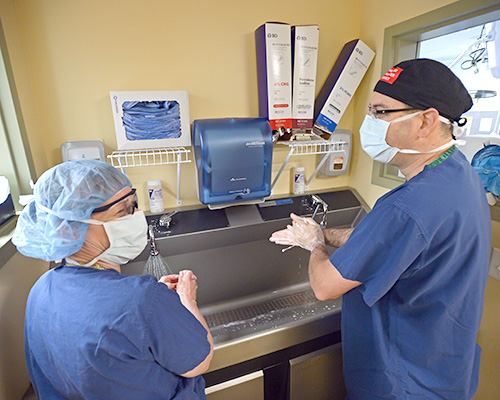
Trigger Finger Treatment in Jefferson, Northern Lewis, & Southern St. Lawrence Counties
Whether you’re a civilian or military resident with trigger finger, you can access high-quality treatment right from the orthopedic clinic at Carthage Area Hospital. Since its founding in 2009, our clinic has expertly served residents in need of shoulder and upper-extremity orthopedic care in Jefferson, northern Lewis, and southern St. Lawrence counties. Learn more information about receiving treatment for trigger finger at Carthage Area Hospital Orthopedic Clinic.
Trigger Finger Symptoms and Causes
Trigger finger, also known as stenosing tenosynovitis, is a painful medical condition in which a finger tendon sheath becomes inflamed and interferes with the normal gliding motion, causing irritation. Prolonged irritation of the tendon sheath can result in further issues, such as stiffness, scarring, and thickening. Symptoms may include:
- Finger stiffness, especially in the morning
- A popping or clicking sensation when moving your finger
- Pain and tenderness
- A bump (nodule) forming in the palm at the base of the affected finger
- Finger occasionally catching or locking in a bent position
- Finger locked in a bent position, which you are unable to straighten
Any finger, including the thumb, can be affected by trigger finger. While the exact causes of trigger finger are unknown, some factors may increase your risk of developing this condition. Jobs and hobbies that involve repetitive or forceful hand use and prolonged gripping may contribute. Medical conditions, such as diabetes and rheumatoid arthritis, may also increase your risk. Trigger finger can also develop as a possible side effect of carpal tunnel syndrome surgery, especially in the first six months after the procedure.
Trigger Finger Treatment
The treatment of trigger finger depends on the severity of the pain and locking. At Carthage Area Hospital, our physicians work alongside patients to provide personalized care and offer the most appropriate treatment for the situation. Since 2009, CAH Orthopedic Clinic has been working to establish a “Center of Excellence” for shoulders and upper-extremity orthopedics. Dr. Nata Parnes is the Director of Orthopedics at Carthage Area Hospital and has received national and international awards for excellence in his field. Dr. Parnes diagnoses and treats orthopedic conditions in both civilian and military patients. Possible treatments for trigger finger may include:
Rest
The doctor may recommend you rest your hands and refrain from engaging in tasks that require repetitive gripping, repeated clutching, or the continuous use of vibrating hand-held gear until your symptoms improve.
Splinting
The doctor may have you wear a splint to keep the affected finger in a straight and extended position for several weeks. Splinting allows the tendon to rest and heal.
Exercises
Gentle stretching exercises may be recommended to help maintain mobility and decrease stiffness in the affected finger.
Medications
Over-the-counter medications, such as nonsteroidal anti-inflammatory drugs (NSAIDs) and acetaminophen, may be recommended for pain relief.
Steroid Injections
Corticosteroid, or cortisone, is an anti-inflammatory steroid medication that can be used to reduce swelling and irritation of the tendon. It is typically injected into the tendon sheath at the base of the affected finger to allow it to glide freely without catching or locking. More than one treatment may be needed.
Surgical Treatment
Surgery may be recommended if you have a severe case or other more conservative treatments have proven ineffective.
Our clinic is open Monday through Friday from 8:00 a.m. to 4:00 p.m., and we accept most insurance policies, including TRICARE, Martin’s Point, Medicaid, and Medicare.
Schedule an Appointment Today
Depend on the experts at Carthage Area Hospital to treat your case of trigger finger with care and compassion. We aim to improve the quality of life and wellbeing of the residents in Jefferson, northern Lewis, and southern St. Lawrence counties. Contact us today at (315) 493-3333 to request an appointment.
